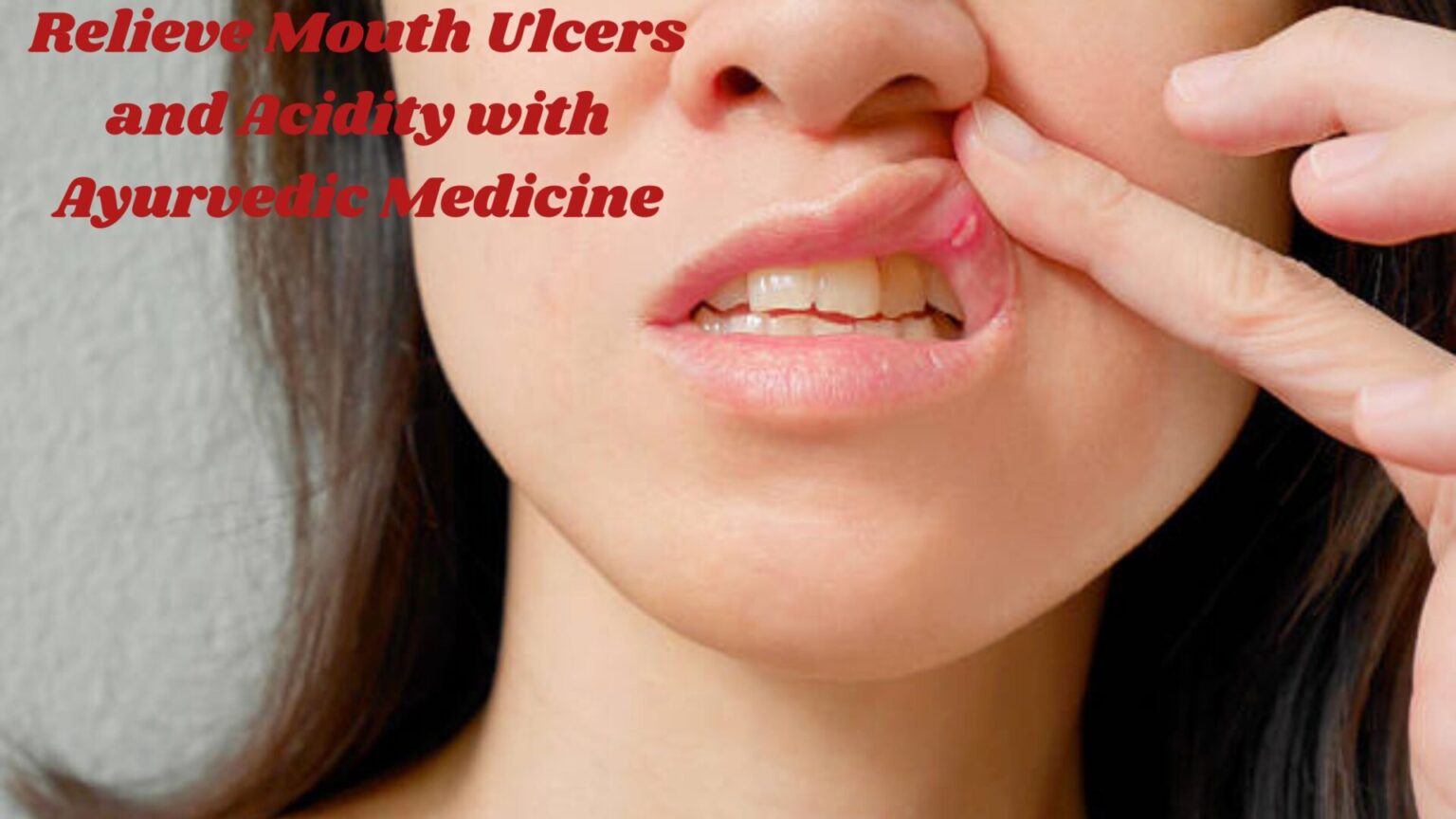Introduction:-
Natural Relief: Ayurvedic Solutions for Mouth Ulcers and Acidity

Are you tired of battling mouth ulcers and digestive distress? If so, you’re not alone. These common ailments can cause discomfort and disrupt your daily routine. Fortunately, there’s a natural solution that has been trusted for centuries: Ayurvedic medicine.
Ayurveda, the ancient Indian system of medicine, offers a holistic approach to health and wellness. It focuses on balancing the body, mind, and spirit to promote overall well-being. When it comes to relieving mouth ulcers and digestive distress, Ayurvedic remedies can offer effective relief without the side effects of conventional medications.
Mouth ulcers, also known as canker sores, are small, painful lesions that can develop on the inside of the mouth, cheeks, lips, or tongue. They can be caused by various factors, including stress, hormonal changes, dietary deficiencies, and food allergies. Digestive distress, on the other hand, encompasses a range of symptoms such as bloating, gas, indigestion, and acidity, which can be triggered by poor dietary habits, stress, and other lifestyle factors.
Are there specific herbs or herbal formulations within Ayurveda that are recommended for addressing mouth ulcers and acidity?
Yes, Ayurveda offers several herbs and herbal formulations that are recommended for addressing mouth ulcers and acidity. Here are some commonly used ones:
- Triphala: Triphala is a traditional Ayurvedic formulation composed of three fruits: Amalaki (Emblicaofficinalis), Bibhitaki (Terminalia bellirica), and Haritaki (Terminalia chebula). It is known for its detoxifying and rejuvenating properties, which can help improve digestion and alleviate acidity.
- Yashtimadhu (Licorice): Licorice root (Glycyrrhizaglabra) has anti-inflammatory and soothing properties that can help reduce inflammation in the digestive tract and promote healing of mouth ulcers. It is often used internally as well as in topical applications.
- Amla (Indian Gooseberry): Amla is rich in vitamin C and antioxidants, making it beneficial for boosting immunity and promoting digestive health. It can help reduce acidity and inflammation in the stomach, providing relief from symptoms of acidity.
- Neem (Azadirachtaindica): Neem is known for its antibacterial and anti-inflammatory properties, which can help treat mouth ulcers by reducing inflammation and preventing bacterial infections. It can be used as a mouthwash or applied topically to the affected area.
- Trikatu: Trikatu is an Ayurvedic herbal blend consisting of three pungent spices: ginger (Zingiberofficinale), black pepper (Piper nigrum), and long pepper (Piper longum). It is commonly used to stimulate digestion, improve appetite, and alleviate symptoms of acidity.
- KamadudhaRas: KamadudhaRas is a classical Ayurvedic formulation made from calcined pearls, conch shell, and other mineral ingredients. It has cooling and anti-inflammatory properties that can help neutralize excess stomach acid and provide relief from acidity.
- JatyadiTaila: JatyadiTaila is an Ayurvedic herbal oil used externally to treat mouth ulcers and oral infections. It contains ingredients like neem, turmeric, and licorice, which have antimicrobial and healing properties.
- Shatavari (Asparagus racemosus): Shatavari is a rejuvenating herb known for its cooling and soothing properties. It can help alleviate inflammation in the digestive tract and promote healing of mouth ulcers.
These herbs and formulations are often used in Ayurvedic practice to address mouth ulcers and acidity. However, it’s essential to consult with a qualified Ayurvedic practitioner or healthcare professional before using any herbal remedies, especially if you have underlying health conditions or are taking medications. They can provide personalized recommendations based on your individual constitution and health needs.
How does Ayurvedic medicine approach the treatment of mouth ulcers and acidity compared to conventional medicine?
Ayurvedic medicine and conventional medicine take different approaches to treating mouth ulcers and acidity. Here’s a comparison of their approaches:
- Holistic vs. Symptomatic Treatment:
- Ayurvedic Medicine: Ayurveda takes a holistic approach to health, considering the individual’s overall well-being, lifestyle, and imbalances in the body’s energies (doshas). Treatment focuses on addressing the root cause of the problem rather than just alleviating symptoms.
- Conventional Medicine: Conventional medicine often focuses on symptomatic treatment, aiming to provide immediate relief from symptoms like pain and discomfort. While it may include lifestyle recommendations, the emphasis is typically on medications to manage symptoms.
- Individualized Treatment vs. One-Size-Fits-All Approach:
- Ayurvedic Medicine: Ayurveda emphasizes individualized treatment based on a person’s unique constitution (dosha), imbalances, and specific symptoms. Remedies and therapies are tailored to address the individual’s needs.
- Conventional Medicine: Conventional treatments for mouth ulcers and acidity often follow a standardized approach, with similar medications or therapies prescribed for most patients with these conditions.
- Natural Remedies vs. Pharmaceutical Drugs:
- Ayurvedic Medicine: Ayurvedic treatments for mouth ulcers and acidity primarily involve natural remedies such as herbal formulations, dietary modifications, and lifestyle changes. These remedies are often considered gentler on the body and have fewer side effects.
- Conventional Medicine: Conventional treatments may involve the use of pharmaceutical drugs such as antacids, proton pump inhibitors (PPIs), and topical medications for mouth ulcers. While effective, these medications may come with side effects and long-term risks.
- Focus on Prevention vs. Reactive Treatment:
- Ayurvedic Medicine: Ayurveda places significant emphasis on preventive measures to maintain overall health and prevent the recurrence of conditions like mouth ulcers and acidity. This includes dietary recommendations, lifestyle modifications, and practicing good oral hygiene.
- Conventional Medicine: Conventional medicine often focuses on treating symptoms as they arise rather than preventing them from occurring in the first place. While preventive measures are recommended, they may not be as central to treatment strategies.
- Long-Term Healing vs. Immediate Relief:
- Ayurvedic Medicine: Ayurvedic treatments aim for long-term healing by addressing the underlying imbalances in the body. While it may take time to see results, the goal is to achieve sustainable improvement in overall health.
- Conventional Medicine: Conventional treatments often provide immediate relief from symptoms but may not address the underlying causes. Long-term use of medications may be required to manage symptoms effectively.
How long does it typically take to see results when using Ayurvedic medicine for mouth ulcers and acidity?
The time it takes to see results when using Ayurvedic medicine for mouth ulcers and acidity can vary depending on several factors, including the severity of the condition, individual constitution, adherence to treatment, and underlying health issues. Here are some general guidelines:

- Mild Cases: In mild cases of mouth ulcers and acidity, where symptoms are relatively minor, individuals may start experiencing relief within a few days to a week of starting Ayurvedic treatment. This may include a reduction in pain, inflammation, and discomfort.
- Moderate Cases: For moderate cases, where symptoms are more persistent or severe, it may take a few weeks to several weeks to see significant improvement with Ayurvedic treatment. Consistent use of herbal remedies, dietary modifications, and lifestyle changes is important for achieving lasting results.
- Chronic Conditions: Chronic or long-standing cases of mouth ulcers and acidity may require more time and patience to see noticeable improvement. It may take several weeks to months of consistent Ayurvedic treatment to address underlying imbalances and promote healing.
- Individual Response: Each individual responds differently to Ayurvedic treatment based on their unique constitution (dosha), overall health, and lifestyle factors. Some people may experience faster results, while others may require more time to see improvement.
- Comprehensive Approach: Ayurvedic treatment typically involves a comprehensive approach that addresses the root cause of the condition, promotes overall health and well-being, and prevents recurrence. While immediate relief of symptoms is important, long-term healing and prevention are equally emphasized in Ayurveda.
It’s essential to consult with a qualified Ayurvedic practitioner or healthcare professional for personalized guidance and treatment recommendations tailored to your specific needs. They can assess your condition, recommend appropriate herbal remedies and therapies, and provide guidance on diet, lifestyle, and other supportive measures to optimize your healing journey. Additionally, they can monitor your progress and make adjustments to your treatment plan as needed to ensure the best possible outcomes.
What role does holistic healing and balancing the body’s natural energies play in Ayurvedic approaches to addressing mouth ulcers and acidity?
In Ayurveda, holistic healing and balancing the body’s natural energies play a fundamental role in addressing mouth ulcers and acidity. Ayurveda views health as a state of balance between the body, mind, and spirit, and it considers various factors such as diet, lifestyle, emotions, and environment in assessing and treating health conditions. Here’s how holistic healing and balancing the body’s natural energies are incorporated into Ayurvedic approaches to addressing mouth ulcers and acidity:
- Understanding Individual Constitution (Prakriti) and Imbalances (Vikriti): Ayurveda recognizes that each person has a unique constitution (prakriti) determined by the three doshas: Vata, Pitta, and Kapha. Imbalances or disturbances in these doshas can lead to health issues such as mouth ulcers and acidity. Ayurvedic practitioners assess an individual’s prakriti and vikriti to understand their underlying imbalances and tailor treatment accordingly.
- Identifying Root Causes: Ayurveda emphasizes identifying and addressing the root causes of health conditions rather than merely treating symptoms. For mouth ulcers and acidity, imbalances in digestive fire (Agni), accumulation of toxins (ama), and disturbances in the doshas are often considered contributing factors. Holistic healing involves addressing these underlying imbalances through dietary modifications, lifestyle changes, herbal remedies, and therapeutic practices.
- Promoting Digestive Health: Digestive health is central to Ayurvedic approaches to addressing mouth ulcers and acidity. Ayurveda emphasizes the importance of maintaining strong digestive fire (Agni) to properly digest food, eliminate toxins, and support overall health. Holistic healing strategies aim to strengthen Agni through appropriate dietary choices, digestion-enhancing herbs, and lifestyle practices such as mindful eating and stress management.
- Balancing Doshas:Ayurvedic treatments for mouth ulcers and acidity focus on balancing the doshas to restore harmony and health. Imbalances in Pitta dosha, associated with heat and acidity, are often addressed through cooling and soothing therapies, dietary recommendations, and herbs that pacify Pitta. Similarly, balancing Vata and Kaphadoshas may also be necessary, depending on the individual’s constitution and specific imbalances.
- Stress Management: Ayurveda recognizes the impact of stress on digestive health and overall well-being. Stress can aggravate Pitta dosha, weaken Agni, and contribute to digestive disturbances such as acidity. Holistic healing approaches include stress-reducing practices such as yoga, meditation, breathing exercises, and lifestyle modifications to promote relaxation and emotional balance.
- Encouraging Mind-Body Connection: Ayurveda recognizes the interconnectedness of the mind and body in health and disease. Emotional factors such as anxiety, anger, and worry can affect digestive function and exacerbate conditions like mouth ulcers and acidity. Holistic healing involves addressing emotional imbalances through practices that promote mental clarity, emotional resilience, and positive outlook.
By adopting a holistic approach that addresses the root causes of mouth ulcers and acidity while promoting balance and well-being on all levels, Ayurvedic medicine offers comprehensive and sustainable solutions for optimizing digestive health and overall vitality.
In conclusion,
Ayurvedic medicine offers natural and effective solutions for relieving mouth ulcers and digestive distress. By incorporating Ayurvedic remedies into your daily routine and making healthy lifestyle choices, you can experience relief from these common ailments and enjoy better digestive health.






